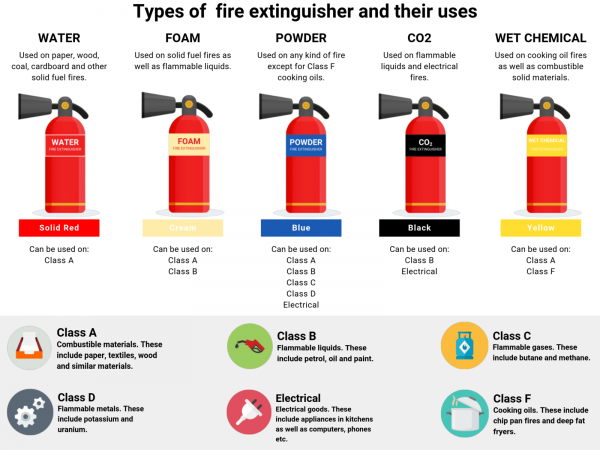Blog Post
The Basics & Importance of Ship Fire Fighting System
Posted By: Harsh Bamnolia
Posted On : 15-Apr-2025

The Basics & Importance of Ship Fire Fighting System
Ship Fire Fighting System: An Overview
The ship fire fighting system is an essential part of maritime safety that ensures onboard fires are promptly detected and effectively extinguished to protect life, cargo, and property.
Ship fires can escalate quickly, especially in confined spaces and around flammable materials, making a robust fire fighting system critical for any sea-going vessel.
The ship fire fighting system integrates detection, suppression, and control mechanisms to handle different classes of fires and operate under challenging sea conditions.
Components and Importance of Ship Fire Fighting System
A ship fire fighting system consists of multiple components working together to detect and combat fires. These components fall under two categories: portable fire fighting systems and fixed fire fighting systems.
1. Fire Detection Systems
Smoke Detectors
Flame Detectors (IR, UV, or combination)
Heat Detectors
Fire Alarm Panels
Detection systems provide early warning, allowing crew members to act before a fire spreads.
2. Fire Suppression Systems
Portable Fire Extinguishers: CO2, foam, dry chemical, and water-based extinguishers designed for specific fire types.
Fixed Fire Suppression Systems: Include CO2 flooding systems, dry chemical powder systems, water mist systems, and foam systems used for engine rooms, cargo holds, and electrical compartments.
Sprinkler Systems: Automatically activated by heat, suitable for accommodation and galley areas.
3. Emergency Escape and Breathing Devices
Emergency Escape Breathing Devices (EEBDs) for crew members during evacuation.
Self-Contained Breathing Apparatus (SCBA) for firefighters onboard.
4. Fire Pumps and Hydrant Systems
Fire main system with pumps, hydrants, hoses, and nozzles.
Ensures water delivery during fire-fighting operations.
Importance of Ship Fire Fighting System
Protection of Life: The top priority is safeguarding crew and passengers against the fatal risks of smoke inhalation and burns.
Cargo and Asset Protection: Fires can damage expensive cargo and cause massive financial losses.
Compliance with Regulations: SOLAS and IMO regulations mandate proper shipboard fire safety systems.
Prevention of Environmental Hazards: Fire on ships carrying oil or chemicals can lead to ecological disasters.
Business Continuity: Avoiding downtime, detention, or penalties due to poor fire safety compliance.
Types of Ship Fire Fighting Systems by Marinetech
Marinetech Safety & Shipping Corporation provides a wide range of fire fighting equipment tailored for marine applications. Our offerings ensure compliance with international regulations and include:
Smoke Detectors
Used in accommodation areas and machinery spaces to give early warning signals. Marinetech supplies both conventional and addressable detectors.
IR Flame Detectors
Designed to detect infrared radiation from flames. Ideal for engine rooms and cargo holds. Quick response and low false alarms make them highly reliable.
Heat Detectors
React to temperature changes and are best used in places where smoke detectors may cause false alarms, such as galleys.
UV Flame Detectors
Detect ultraviolet radiation emitted by flames. They work best in fast-flaming fires and are installed in explosive or flammable cargo areas.
Fire Alarm System Control Panels
These central units receive signals from detectors and trigger alarms and suppression systems. Marinetech’s panels are user-friendly and come with testing and monitoring features.
These components are designed for easy integration into existing ship infrastructure and follow all major class and flag regulations.
Ship Fire Fighting System Installation, Servicing & Maintenance
Installation of a fire fighting system is only part of ensuring fire safety onboard. Regular inspection, testing, and servicing are crucial to keep systems in optimal condition. Marinetech offers:
Annual Inspection & Certification: Includes checking all components for functionality and compliance.
Hydrostatic Testing of Cylinders: Ensures CO2 and other suppression system cylinders are safe.
SCBA and EEBD Maintenance: Functional checks, cleaning, and refilling.
Fire Alarm Testing: Ensures detectors and alarm panels are responsive.
Sprinkler System Checks: Verifies pressure, valve operation, and leakage detection.
Routine servicing helps vessels stay compliant and safe, reducing downtime or detentions during inspections.
Conclusion
An effective ship fire fighting system is a non-negotiable safety feature for any vessel navigating today’s waters. From early detection to immediate suppression, these systems help safeguard life, cargo, and the environment.
Regular servicing, regulatory compliance, and proper training are essential to ensure these systems work as intended during emergencies.
Marinetech Safety & Shipping Corporation offers a comprehensive range of fire fighting equipment and servicing that ensures your vessel’s fire safety is never compromised.
From smoke detectors to full alarm panels, we supply SOLAS-approved systems tailored for every ship type.
Explore our full range here: https://marinetechss.com/supplies/fire-fighting-equipment-and-appliances